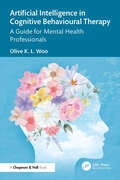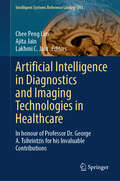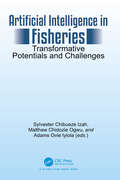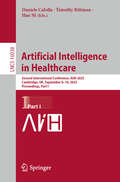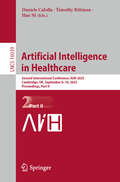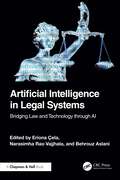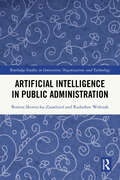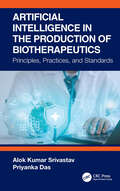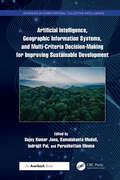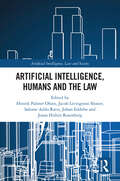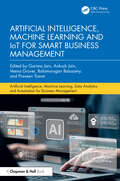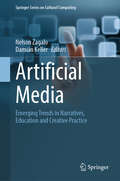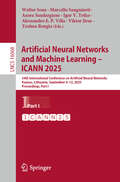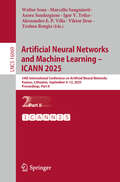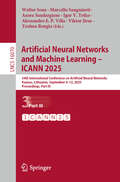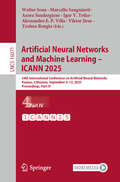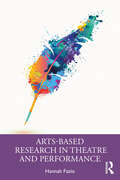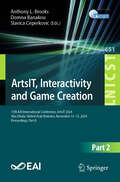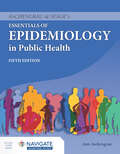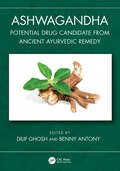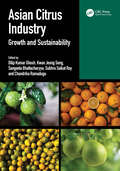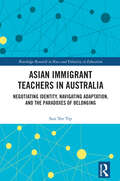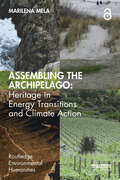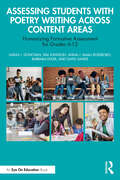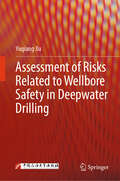- Table View
- List View
Artificial Intelligence in Cognitive Behavioural Therapy: A Guide for Mental Health Professionals
by Olive K. WooThis book examines the transformative potential of integrating artificial intelligence (AI) with cognitive behavioural therapy. Tailored for mental health professionals, it offers evidence-based strategies and ethical frameworks for the potential adoption of AI in therapeutic practice.Designed for readers with little or no understanding of AI, this book explores key concepts such as machine learning, natural language processing, and deep learning, in accessible ways, while demonstrating their potential applications in cognitive behavioural therapy. It addresses pressing ethical considerations, including algorithmic bias, data security, and the responsible integration of AI in mental health care. By balancing innovation with ethical rigour, this resource empowers readers to understand innovative approaches while maintaining the integrity of their practice.This is an essential guide for clinical psychologists, counsellors, social workers, psychiatrists, educators, and researchers who want to explore the application of AI in cognitive behavioural therapy and stay at the forefront of therapeutic research and practice.
Artificial Intelligence in Diagnostics and Imaging Technologies in Healthcare: In honour of Professor Dr. George A. Tsihrintzis for his Invaluable Contributions (Intelligent Systems Reference Library #281)
by Lakhmi C. Jain Chee Peng Lim Ajita JainThis book brings together cutting-edge research and innovative applications of artificial intelligence, machine learning, wearable technologies and decision support systems in modern healthcare. The chapters demonstrate how these artificial intelligence innovations are driving next-generation healthcare solutions. The chapters present diverse clinical applications through advanced artificial intelligence approaches in diagnostics, treatment, rehabilitation and healthcare management, with a strong emphasis on patient-centred solutions. This book is directed to students, professors, researchers, practitioners in the field of healthcare, engineering, computer science and related areas.
Artificial Intelligence in Fisheries: Transformative Potentials and Challenges
by Sylvester Chibueze Izah Matthew Chidozie Ogwu Adams Ovie IyiolaArtificial Intelligence in Fisheries delves into the transformative role of AI in the fisheries and aquaculture. It provides a comprehensive overview of how AI applications—from fish stock assessment and environmental monitoring to sustainable aquaculture and policy development—are revolutionizing the sector. By enhancing data-driven decision-making, increasing efficiency, and addressing ecological challenges, this book serves as a practical guide for scientists, industry professionals, and policymakers. With contributions from experts, scholars and practitioners, the book brings together theoretical foundations and real-world applications to explore AI's potential to drive sustainable practices in fisheries. Readers will gain insight into how AI can help optimize resource use, protect endangered species, and promote responsible fishing practices. It offers valuable perspectives and actionable strategies to support the future of sustainable fisheries and aquaculture.
Artificial Intelligence in Healthcare: Second International Conference, AIiH 2025, Cambridge, UK, September 8–10, 2025, Proceedings, Part I (Lecture Notes in Computer Science #16038)
by Hao Ni Daniele Cafolla Timothy RittmanThe two-volume set constitutes the proceedings of the Second International Conference on Artificial Intelligence in Healthcare, AIiH 2025, which took place in Cambridge, UK, in September 2025. The 60 full papers included in this book were carefully reviewed and selected from 83 submissions. They were organized in topical sections as follows: Health informatics, Personalised Healthcare, Robotics, Assisted Living Technology, Computational Medicine, Long-term Health Conditions, Maternity and Women&’s Health and Wellbeing.
Artificial Intelligence in Healthcare: Second International Conference, AIiH 2025, Cambridge, UK, September 8–10, 2025, Proceedings, Part II (Lecture Notes in Computer Science #16039)
by Hao Ni Daniele Cafolla Timothy RittmanThe two-volume set constitutes the proceedings of the Second International Conference on Artificial Intelligence in Healthcare, AIiH 2025, which took place in Cambridge, UK, in September 2025. The 60 full papers included in this book were carefully reviewed and selected from 83 submissions. They were organized in topical sections as follows: Health informatics, Personalised Healthcare, Robotics, Assisted Living Technology, Computational Medicine, Long-term Health Conditions, Maternity and Women&’s Health and Wellbeing.
Artificial Intelligence in Legal Systems: Bridging Law and Technology through AI
by Eriona Çela Narasimha Rao Vajjhal Behrouz A. AslaniThis book presents a comprehensive analysis of the transformative impact of artificial intelligence (AI) on legal frameworks within the European Union and beyond. It illustrates both the promising benefits of AI in improving access to justice and the significant challenges that necessitate thoughtful regulatory frameworks and interdisciplinary cooperation.This book highlights the expansive applications of AI, ranging from case management to predictive analytics, while also scrutinizing ethical challenges and legal implications. It addresses the pressing issue of data protection in the context of Generative Pre-trained Transformer (GPT) technology, emphasizing the EU’s commitment to individual privacy rights. This book also evaluates AI’s role in public governance, using Albania as a case study, and examines the potential of blockchain technology in enhancing legal processes. The ethical nuances surrounding AI’s integration into legal systems are critically examined, particularly regarding algorithmic bias and human oversight. This book advocates for a collaborative approach involving legal experts and data scientists to navigate these complexities effectively.This book is a key resource for postgraduate students, researchers, and legal professionals seeking to better understand the benefits and risks of incorporating AI into legal practice.
Artificial Intelligence in Public Administration (Routledge Studies in Innovation, Organizations and Technology)
by Radosław Wolniak Bożena Skotnicka-ZasadzieńThis book presents a conceptualization of the process of using artificial intelligence (AI) in public administration, along with its operationalization in terms of technology, competence, and the use of AI by employees of municipal offices. The authors offer a holistic examination, drawing on a multidisciplinary approach that combines theoretical insights with empirical analyses, to develop a theoretical model for improving the use of AI in public administration.The book provides a nuanced understanding of the complex interactions between AI technologies, governance structures, and public service delivery models, as well as diverse case studies across administrative domains to offer cross-national insights and shedding light on the contextual factors shaping AI adoption and implementation strategies. Through dedicated chapters on ethics and safety, the book also critically examines the challenges and opportunities policymakers must navigate when implementing AI.Combining theory with practice, this book will be of interest to scholars and post-graduate students in the fields of public administration, policy studies, governance as well as artificial intelligence and technology management.
Artificial Intelligence in the Production of Biotherapeutics: Principles, Practices, and Standards
by Priyanka Das Alok Kumar SrivastavThe transformative role of artificial intelligence (AI) in modern biomanufacturing focuses on key areas such as process analytical technology (PAT), Good Manufacturing Practice (GMP) compliance, predictive analytics, and AI-driven quality systems. It bridges cutting-edge AI applications with the complexities of biotherapeutic production, offering insights into automation, real-time monitoring, and process optimization.Delving into the core of biomanufacturing, the book provides a structured journey through its critical phases. It begins with an introduction to modern biomanufacturing principles, quality by design approaches, and the integration of AI. Subsequent chapters examine raw material management, lean manufacturing practices, and the application of predictive analytics to optimize supply chains. Readers will explore advanced tools such as AI-enhanced data acquisition in PAT, automated standard operating procedures (SOPs), and AI-driven process controls for fermenters and chromatography systems. The text also addresses GMP essentials, including personnel management, hygienic facility design, and pharmaceutical water systems. Key chapters highlight AI’s role in validation processes, sterile packaging, and regulatory compliance, referencing global guidelines from organizations such as the WHO, FDA, and ICH. Real-world case studies featuring therapeutic proteins, monoclonal antibodies, and vaccines underscore the practical applications of AI in scaling and maintaining biotherapeutic production.This book equips readers with a comprehensive understanding of AI’s potential to enhance efficiency, accuracy, and compliance in biomanufacturing. Whether you are a professional, researcher, or student, this guide offers actionable insights into leveraging AI to revolutionize biotherapeutic production while adhering to the highest industry standards.What You Will Learn: Understand how AI enhances every phase of biotherapeutic production, from raw material management to regulatory compliance, optimizing efficiency, accuracy, and quality Explore the role of AI in advanced data acquisition, process control, and continuous improvement, including applications in fermenters, flow filtration, and chromatography systems Gain insights into leveraging AI for automating standard operating procedures (SOPs), predictive maintenance, quality assurance, and adhering to global GMP standards like WHO and FDA guidelines Learn how AI transforms upstream and downstream processes, ensures sterility in packaging, and supports case studies on therapeutic proteins, monoclonal antibodies, and human vaccines Discover the potential of AI in shaping the future of biomanufacturing, including challenges, data security, and the ethical implications of AI-driven automation
Artificial Intelligence, Geographic Information Systems, and Multi-Criteria Decision-Making for Improving Sustainable Development (Advances in Computational Collective Intelligence)
by Indrajit Pal Kamalakanta Muduli Purushottam Meena Sujoy Kumar JanaThe Asia-Pacific region, home to some of the world’s fastest-growing economies, faces a range of complex challenges, including environmental degradation, the increasing frequency of natural hazards, and rapid urbanization. Addressing these issues, which many countries across the globe are facing, requires innovative, interdisciplinary approaches to promote sustainable development and enhance resilience. Geographic information systems (GIS), when combined with multi-criteria decision-making (MCDM) techniques and advanced technologies such as artificial intelligence (AI), offer powerful tools to tackle these multifaceted problems. AIGIS integrates AI with GIS to derive insights from geospatial data. The fusion of AI techniques with GIS enhances data analysis, visualization, and decision-making. Artificial Intelligence, Geographic Information Systems, and Multi-Criteria Decision-Making for Improving Sustainable Development explore how these integrated tools can support decision-making processes aimed at advancing sustainable development.Drawing on research and insights from diverse disciplines, the book looks at how GIS, MCDM, and AI can provide solutions for disaster risk reduction, environmental monitoring, urban planning, and natural resource management. Through diverse case studies and theoretical explorations, this book highlights the value of integrated geospatial tools in facilitating informed decision-making and fostering resilient societies in the face of evolving challenges. It covers a wide range of topics, including the following: Site-soil-geology assessments in Fiji Flood risk analysis in Hong Kong Air quality management in Delhi during the COVID-19 pandemic Vegetation health monitoring in Thailand Bringing together the work of academicians, practitioners, and decision-makers, the book reflects the growing recognition towards effective and sustainable solutions to complex problems, which require a multidimensional approach, integrating scientific, economic, and social considerations. By providing the latest research and practical applications of MCDM, AI, and GIS, it contributes to ongoing efforts to build a more sustainable and resilient future for the Asia-Pacific region, as well as for the world.
Artificial Intelligence, Humans and the Law (Artificial Intelligence, Law and Society)
by Henrik Palmer Olsen, Jacob Livingston Slosser, Salome Addo Ravn, Johan Eddebo and Jonas Hultin RosenbergThis book takes up the contentious issue of artificial intelligence (AI), and more specifically the evolving nature of AI-mindedness, as a legal entity in society. With the increasing potential of AI suggested by the recent surge in creative and administrative tools and large language models, there is a growing concern about the ethical and legal implications of incorporating AI into society. As these systems become even more powerful and their ability to mimic human output grows, the question of whether and how to attribute mental states to AI, even in its most nascent form, has become a pressing concern. It is, for example, unclear what kind of mind AI might be capable of and therefore what the proper legal analogy might be for how we attribute reasoning capability, intent, responsibility, liability, agency, and so on, to it. This book contributes to this new and important area by bringing together front-line research from diverse fields on the topic of understanding ‘AI-mindedness’, and how it – and our relationship to it – might be regulated. Through a collection of chapters, written by experts from law, public administration, tort, psychoanalysis, philosophy, linguistics, computer science, and political theory, this volume offers an insightful examination of current research, theoretical frameworks, and practical applications that are shaping the AI–human relationship. This book will be of considerable interest to scholars and researchers working in legal theory, socio-legal studies, law and technology, and science and technology studies.
Artificial Intelligence, Machine Learning and IoT for Smart Business Management (Artificial Intelligence, Machine Learning, Data Analytics and Automation for Business Management)
by Garima Jain Balamurugan Balusamy Veena Grover Ankush Jain Praveen TomarThis book investigates the transformative impact of AI, ML, data analytics, and IoT on modern business, emphasizing their roles in strategic growth, operational efficiency, and data-driven decision-making. Through real-world case studies, strategic frameworks, and ethical considerations, it offers actionable insights for integrating these technologies. Covering emerging trends and responsible adoption, this book is an essential resource for professionals navigating digital transformation and achieving sustainable success. Explore the application of AI, ML, data analytics, and IoT within business contexts, emphasizing their roles in strategic growth, operational efficiency, and decision-making. Provides methodologies for maximizing ROI, mitigating risks, and fostering innovation. Explores predictive modeling, market segmentation, and business intelligence for competitive advantage. Examines cutting-edge automation technologies that optimize processes and enhance workforce efficiency. Investigates neuro-fuzzy systems in financial forecasting to improve predictive accuracy and decision-making. This book serves as a practical guide for professionals and as a reference for scholars, researchers, and students of computer science and business management.
Artificial Media: Emerging Trends in Narratives, Education and Creative Practice (Springer Series on Cultural Computing)
by Damián Keller Nelson ZagaloA groundbreaking exploration of the evolving relationship between the fields of artificial intelligence and creativity studies, Artificial Media charts the course of a transformative path toward hybrid methodologies involving computing and human-centric approaches. Scholars and practitioners from leading research centers in South America, Asia and Europe delve into theoretical and philosophical frameworks, practical deployments and data-based critical analyses of artificial-media initiatives that reconfigure authorship and collaboration. Co-creation, collective memory, and situated-knowledge practices are featured in multiple hands-on examples of technological design, music, visual-arts, journalistic and educational projects that address the ethical and social implications of generative techniques. Through an interdisciplinary lens, this collection, projects a nuanced panorama of both the remarkable results and the complex challenges of emerging artificial-media methods, offering practical insights for anyone seeking to engage with the future of creativity in the age of autonomous machines.
Artificial Neural Networks and Machine Learning – ICANN 2025: 34th International Conference on Artificial Neural Networks, Kaunas, Lithuania, September 9–12, 2025, Proceedings, Part I (Lecture Notes in Computer Science #16068)
by Igor V. Tetko Marcello Sanguineti Yoshua Bengio Walter Senn Ausra Saudargiene Alessandro E. P. Villa Viktor JirsaThe four-volume set LNCS 16068-16071 constitutes the proceedings of the 34th International Conference on Artificial Neural Networks and Machine Learning, ICANN 2025, held in Kaunas, Lithuania, September 9–12, 2025.The 170 full papers and 8 abstracts included in these conference proceedings were carefully reviewed and selected from 375 submissions. The conference strongly values the synergy between theoretical progress and impactful real-world applications, and actively encourages contributions that demonstrate how artificial neural networks are being used to address pressing societal and technological challenges.
Artificial Neural Networks and Machine Learning – ICANN 2025: 34th International Conference on Artificial Neural Networks, Kaunas, Lithuania, September 9–12, 2025, Proceedings, Part II (Lecture Notes in Computer Science #16069)
by Igor V. Tetko Marcello Sanguineti Yoshua Bengio Walter Senn Ausra Saudargiene Alessandro E. P. Villa Viktor JirsaThe four-volume set LNCS 16068-16071 constitutes the proceedings of the 34th International Conference on Artificial Neural Networks and Machine Learning, ICANN 2025, held in Kaunas, Lithuania, September 9–12, 2025.The 170 full papers and 8 abstracts included in these conference proceedings were carefully reviewed and selected from 375 submissions. The conference strongly values the synergy between theoretical progress and impactful real-world applications, and actively encourages contributions that demonstrate how artificial neural networks are being used to address pressing societal and technological challenges.
Artificial Neural Networks and Machine Learning – ICANN 2025: 34th International Conference on Artificial Neural Networks, Kaunas, Lithuania, September 9–12, 2025, Proceedings, Part III (Lecture Notes in Computer Science #16070)
by Igor V. Tetko Marcello Sanguineti Yoshua Bengio Walter Senn Ausra Saudargiene Alessandro E. P. Villa Viktor JirsaThe four-volume set LNCS 16068-16071 constitutes the proceedings of the 34th International Conference on Artificial Neural Networks and Machine Learning, ICANN 2025, held in Kaunas, Lithuania, September 9–12, 2025.The 170 full papers and 8 abstracts included in these conference proceedings were carefully reviewed and selected from 375 submissions. The conference strongly values the synergy between theoretical progress and impactful real-world applications, and actively encourages contributions that demonstrate how artificial neural networks are being used to address pressing societal and technological challenges.
Artificial Neural Networks and Machine Learning – ICANN 2025: 34th International Conference on Artificial Neural Networks, Kaunas, Lithuania, September 9–12, 2025, Proceedings, Part IV (Lecture Notes in Computer Science #16071)
by Igor V. Tetko Marcello Sanguineti Yoshua Bengio Walter Senn Ausra Saudargiene Alessandro E. P. Villa Viktor JirsaThe four-volume set LNCS 16068-16071 constitutes the proceedings of the 34th International Conference on Artificial Neural Networks and Machine Learning, ICANN 2025, held in Kaunas, Lithuania, September 9–12, 2025.The 170 full papers and 8 abstracts included in these conference proceedings were carefully reviewed and selected from 375 submissions. The conference strongly values the synergy between theoretical progress and impactful real-world applications, and actively encourages contributions that demonstrate how artificial neural networks are being used to address pressing societal and technological challenges.
Arts-Based Research in Theatre and Performance
by Hannah FazioArts-based Research in Theatre and Performance provides a roadmap for conducting arts-based research. It offers a vibrant exploration of how ethnography, autoethnography, poetry, and fiction can be used successfully in research projects.This volume delves into a rich array of works from the theatre and performance canon, reframing them through the lens of arts-based research. Readers are introduced to the innovative methodologies and bold contributions of diverse artists and scholars, both contemporary and historical, who may help redefine how readers understand, document, and engage with performance as arts-based research. Each chapter walks the reader through practical exercises so they can develop their techniques and research projects.With reflections on professional and academic practice throughout, this is an accessible guide for students and practitioners wanting to conduct their own arts-based research in theatre, performance, drama therapy, drama education, applied theatre, and other similar fields.
ArtsIT, Interactivity and Game Creation: 13th EAI International Conference, ArtsIT 2024, Abu Dhabi, United Arab Emirates, November 13–15, 2024, Proceedings, Part II (Lecture Notes of the Institute for Computer Sciences, Social Informatics and Telecommunications Engineering #651)
by Anthony L. Brooks Domna Banakou Slavica CeperkovicThis volume constitutes the proceedings of the 13th EAI International Conference on ArtsIT, Interactivity and Game Creation, ArtsIT 2024, in Abu Dhabi, United Arab Emirates, during November 13–15, 2024. The 38 full papers and 4 short papers were presented in this volume were carefully reviewed and selected from 112 submissions. The papers are thematically arranged in the following sections: Part I: Art & Games; Technical; Education, Co-Creativity in multi-modal interaction with generative AI. Part II: Amplifying Creativity: Exploring Digital Musical Interfaces; Illuminating Realities: Creating immersive spaces to promote mindfulness and wellbeing; Posters.
Aschengrau & Seage's Essentials of Epidemiology in Public Health
by Ann AschengrauSeamlessly blending theory and practice, Aschengrau & Seage’s Essentials of Epidemiology in Public Health presents both traditional and modern epidemiological concepts in a clear and accessible way. Broad in scope, the text opens with five chapters covering the basic epidemiologic concepts and data sources. A major emphasis is placed on study design, with separate chapters devoted to each of the three main analytic designs: experimental, cohort, and case-control studies. Full chapters on bias, confounding, and random error, including the role of statistics in epidemiology, ensure that students are well-equipped with the necessary information to interpret the results of epidemiologic studies. For the 5th edition, descriptive data and statistics have been updated throughout, most significantly in Chapters 4 (Sources of Public Health Data) and 5 (Descriptive Epidemiology). The latter chapter also includes a section on the leading causes of morbidity in the U.S. with a summary of COVID-19.
Ashwagandha: Potential Drug Candidate from Ancient Ayurvedic Remedy
by Dilip Ghosh and Benny AntonyFor over 3,000 years, ashwagandha has held a prominent place in Ayurveda and Unani, two of India’s ancient medicinal traditions. This revered herb, with its roots, leaves, and fruits, has been celebrated for its potent medicinal properties and adaptogenic benefits.This book is a comprehensive exploration of ashwagandha’s remarkable therapeutic potential. Drawing from centuries of traditional use and scientific advancements, it delves into the ethnopharmacology, botanical characteristics, phytochemicals, pharmacological activities, clinical trials, safety, toxicity, and formulations of this powerful herb. With growing recognition of ashwagandha as a candidate for drug development, this book critically examines its applications across diverse health domains, from neurological and reproductive health to cancer and arthritis management. It identifies research gaps that must be addressed to elevate ashwagandha to a fully commercialized, evidence-based medical intervention.Ashwagandha: Potential Drug Candidate from Ancient Ayurvedic Remedy provides insights for scientists, healthcare professionals, nutraceutical developers, and regulatory bodies. Whether seeking to develop innovative products, optimize fitness regimens, or craft informed nutritional plans, this book is the ultimate guide to harnessing the full potential of ashwagandha.
Asian Citrus Industry: Growth and Sustainability
by Dilip Kumar Ghosh Kwan Jeong Song Sangeeta Bhattacharyya Subhra Saikat RoyThe citrus industry plays a crucial role in the economies and agricultural landscapes of many Asian countries, contributing significantly to global citrus production and trade. This book provides a comprehensive analysis of the citrus sector across 14 major citrus- producing Asian nations, including China, India, Japan, Korea, Thailand, Bhutan, Nepal, Turkey, Pakistan, Bangladesh, Vietnam, Iran, Sri Lanka, and Indonesia. It presents an in- depth exploration of the historical evolution, production trends, key challenges, and opportunities shaping the citrus industry in Asia. Each chapter delves into country- specific aspects, including citrus production systems, major cultivars, post- harvest management, and production problems influencing the sector. It also highlights critical sustainability issues, including pest and disease management, technological innovations, and market- driven strategies that can enhance productivity and profitability for citrus growers.By integrating a balanced blend of research insights, industry trends, and practical recommendations, Asian Citrus Industry: Growth and Sustainability serves as an essential reference for researchers, policymakers, agribusiness professionals, citrus growers, and students engaged in citriculture and horticulture. It provides valuable perspectives for those interested in understanding the diverse citrus ecosystems of Asia and exploring avenues for sustainable growth and international trade development.
Asian Immigrant Teachers in Australia: Negotiating Identity, Navigating Adaptation, and the Paradoxes of Belonging (Routledge Research in Race and Ethnicity in Education)
by Sun Yee YipThe global movement of people and migration has led to increased mobility within the teaching profession. However, the prevailing expectations regarding the specific desired backgrounds, habitus, and pedagogical ideas of how a teacher should be, act, and understand their work have made the professional transition significantly challenging for immigrant teachers who do not fit into this frame.Drawing on international literature and valuable insights from Asian immigrant teachers in Australia, this book explores the personal, social, and contextual factors governing their professional transition experiences. It examines the diverse and intricate experiences of Asian immigrant teachers as they negotiate their identities, navigate adaptation, and cultivate a sense of belonging within the Australian education system.Set against the backdrop of an increasingly diverse student population and a critical shortage of teachers faced by many countries worldwide, this book offers a timely review of how we can harness the capabilities of the immigrant teacher workforce to meet diverse needs, improve school participation and well-being, and ensure equitable and inclusive education for all students. Readers are encouraged to disrupt existing narratives, interrogate current deficit views about immigrant teachers, and, in doing so, reconceptualise the immigrant professional transition from a new vantage point.
Assembling the Archipelago: Heritage in Energy Transitions and Climate Action (Routledge Environmental Humanities)
by Marilena MelaThis book explores the potential of heritage to enact sustainable human–environment relationships across geographical differences. It does so by travelling to four archipelagoes: the Wadden Islands in the Netherlands, the Cyclades in Greece, Shetland in Scotland, and the Aeolian Islands in Italy. In the face of planetary socioenvironmental crises, the reliance on sustainable development strategies, including the energy transition, on technocratic, top-down solutions fail to counterbalance global agendas of extraction and growth and address environmental injustices in "peripheral" places. This book stresses the need to "think small," arguing that seeds for meaningful change exist in such places and the geographically and historically situated relationships between people and environments. Islands, interconnected yet autonomous places with unique histories, are good places to start. In four archipelagoes, frictions produced both by climate change and climate mitigation ―the fragile consensus around a solar park in the Wadden Sea, conflicts around wind turbine towers in the Aegean, experiments with the tides in Shetland, and volcanic episodes in the Aeolian―come in dialogue with the learning potential of their environmental and cultural heritage. The counterposing of these stories renegotiates established discourses of heritage and sustainability and the associated courses of action in policy and planning.This contribution will resonate with academics, students, policymakers, and activists in heritage studies, environmental humanities, landscape studies, science and technology studies, and sustainability. Readers are invited to participate in the life and troubles of four island landscapes, and to think along on emergent, archipelagic claims towards sustainable and just futures.
Assessing Students with Poetry Writing Across Content Areas: Humanizing Formative Assessment for Grades 6-12
by Kim Johnson Sarah J. Donovan Anna J. Roseboro Barbara Edler Gayle SandsAssessing Students with Poetry Writing Across Content Areas reimagines formative assessment by advocating for a dynamic, poetic approach that delves into students’ meaning-making processes. It is a guide for teachers seeking innovative approaches to formative assessment, promoting a holistic, creative, reflective, and collaborative learning environment. It challenges the limitations of traditional worksheets and quizzes, urging educators to move beyond seeking restrictive answers and embrace students’ texts as pathways to understanding.The authors put forward poetry as a vigorous tool and writing poetry as an act to foster deep learning across content areas. Practical examples of acrostic poems, haiku, and pantoum demonstrate the adaptability of poetic forms to diverse subjects. Through adaptable lesson plans that can be used across history, math, world languages, ELA, and science, the book encourages intentional poetic writing-to-learn activities and explores how poetry might present itself as a short, creative assessment tool that helps teachers see what their students know and can do while also offering them the space to make new meaning in their original poetry.This book is a key resource for in-service educators teaching grades 6-12.
Assessment of Risks Related to Wellbore Safety in Deepwater Drilling
by Yuqiang XuThis book divides the wellbore into two parts based on the characteristics of deepwater drilling engineering: the section from sea level to the subsea wellhead and the section below the mud line. Above the subsea wellhead is connected a blowout preventer and a long riser, while below is a series of casings, causing the subsea wellhead to bear stress from both the upper and lower parts simultaneously, posing a risk of instability in a complex stress environment; Although the construction below the mud line in deepwater drilling is not significantly different from land drilling, there are still challenges such as deep water depth, low temperature, narrow safety density window, shallow geological hazards, natural gas hydrates, and difficulty in determining drilling geological parameters, which greatly increase the risk of drilling engineering. On the basis of systematically explaining the basic theories and methods of the subsea wellhead mechanical stability, wellbore temperature and pressure field calculation during gas kick, prediction of natural gas hydrate generation, and casing program design method and so on, this book analyzes those with higher risks such as wellhead instability, gas kick and blowout, gas hydrate generation and casing program design. And the characteristics and influence rules of uncertain parameters and empirical coefficients are analyzed emphatically by using methods such as probability statistics, and the risk assessment methods of deepwater drilling related to the wellhead and wellbore safety which consider the uncertain parameters are established. This will be of great significance for risk prevention and control in deepwater drilling, optimizing deepwater drilling design and construction plans, improving the lifespan and investment returns of deepwater oil and gas wells, and promoting the development of deepwater drilling technology.
